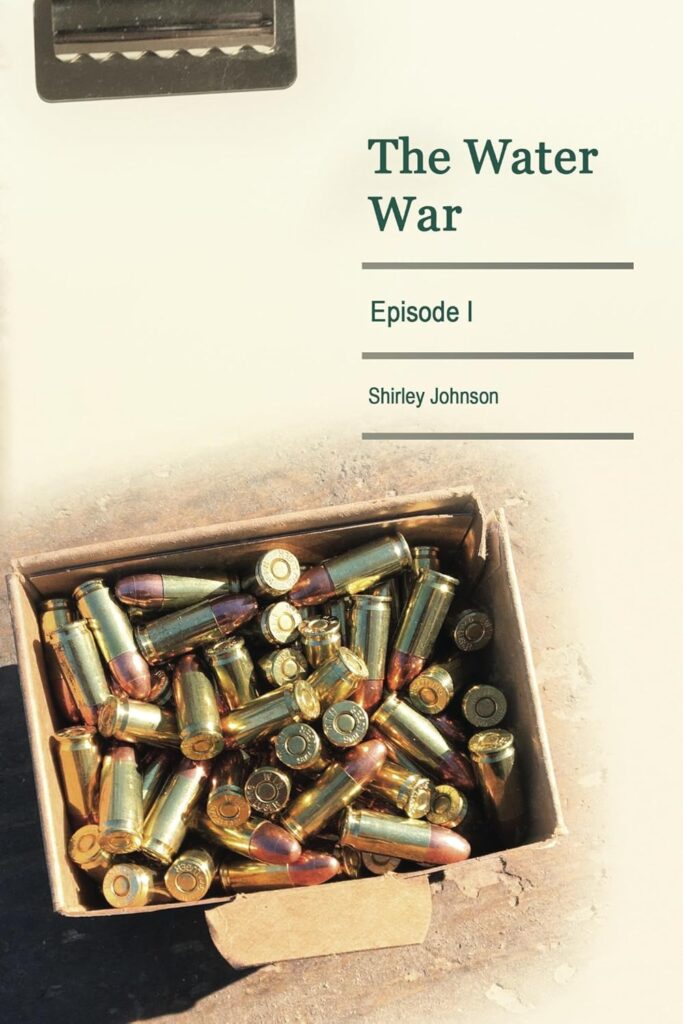The Water War
I read The Water War (Episode 1) by @ShirleyJwriter, and I enjoyed it.

Ms. Johnson’s approach to the peri-apocalypse/fall-of-America genre is delightfully character-centered, and tightly focused on its ordinary folk. Rather than spending any time on the big movers and shakers, any reasons behind the events in question or powerful people exerting any influence over said events, The Water Wars follows a quirky young black woman who is unemployed and unimportant, suffers too much anxiety and smokes too much marijuana (which is probably why she has so much anxiety), but whose bent for paranoia, plus an innate knack for problem solving, and a tactical instinct honed by her pepper ex-husband, make her uniquely equipped to… well, survive, and nothing much more. She won’t save the world, or likely even be remembered by it, but after forming a reluctant friendship with her two single male neighbors (neither of whom are particularly impressive in their own rights), she will prove an indispensable member of their little team of three (eventually four) as they undertake epic quests to the local grocery and Tractor Supply after most everyone has been relocated, presumably to concentration camps, by the water department.
Ms. Johnson, by focusing on the mundane, with a bit of the tongue in cheek, paints a particularly creepy and effective portrait of apocalypse by friendly-faced government overreach in the face of a convenient natural disaster. Basically, it’s the COVID playbook, only for water—or in this case an extended, unexplained nationwide drought—and Johnson’s mindlessly bureaucratic vision of the collapse is effective and infuriating. (The author would later inform me she wrote this first volume in 2015, years before COVID.)
The story escalates rather gaudily at the end, into the realm of suit-and-heel government agents waxing megalomaniacal about disliking their plans being disrupted while executing prisoners summarily with suppressed pistols in front of their dozens of minions, in highly explosive industrial facilities. However, Johnson wisely leaves the reasons behind most of our heroes’ travails mysterious, lost in the fog of war. The protagonists rarely know who is following them or why, who is attacking them or why, or even what government agency they’re dealing with. They move from problem to problem, solving each as best they can, planning their way through Armageddon as competently as three ordinary people with no extraordinary skills and very little understanding of what’s going on around them might.
It’s a study in quirky ordinariness navigating the fall of empire, and character development is on par for commercial literature, but it works. The lead character, with her hoarding habits and gastrointestinal stress responses is entertaining to follow, especially as she seems to have more difficulty solving the problem of how to be friends with her neighbors than how to stay alive when the water isn’t potable.
Call this Libertarian Lit. It’s anti-political, pro-gun, and drug friendly. In that respect, be mindful of audience. Though light on language and devoid of lascivious content, it presents a basically Godless presumption of existence, and it does include drug use rather casually. Ms. Johnson does not take it upon herself to comment on marijuana’s steadily more documented and tragic long term consequences. The protagonist’s use is treated as an innocent foible.
As is so common today, and as the subtitle notes, this is intended as the first in a series.
Gun-friendly fiction from a female author is a rare treat. For audiences properly educated and not impressionable regarding marijuana use, this is a fun, character-driven, slice-of-life, government-skeptical take on the peri-apocalypse genre.